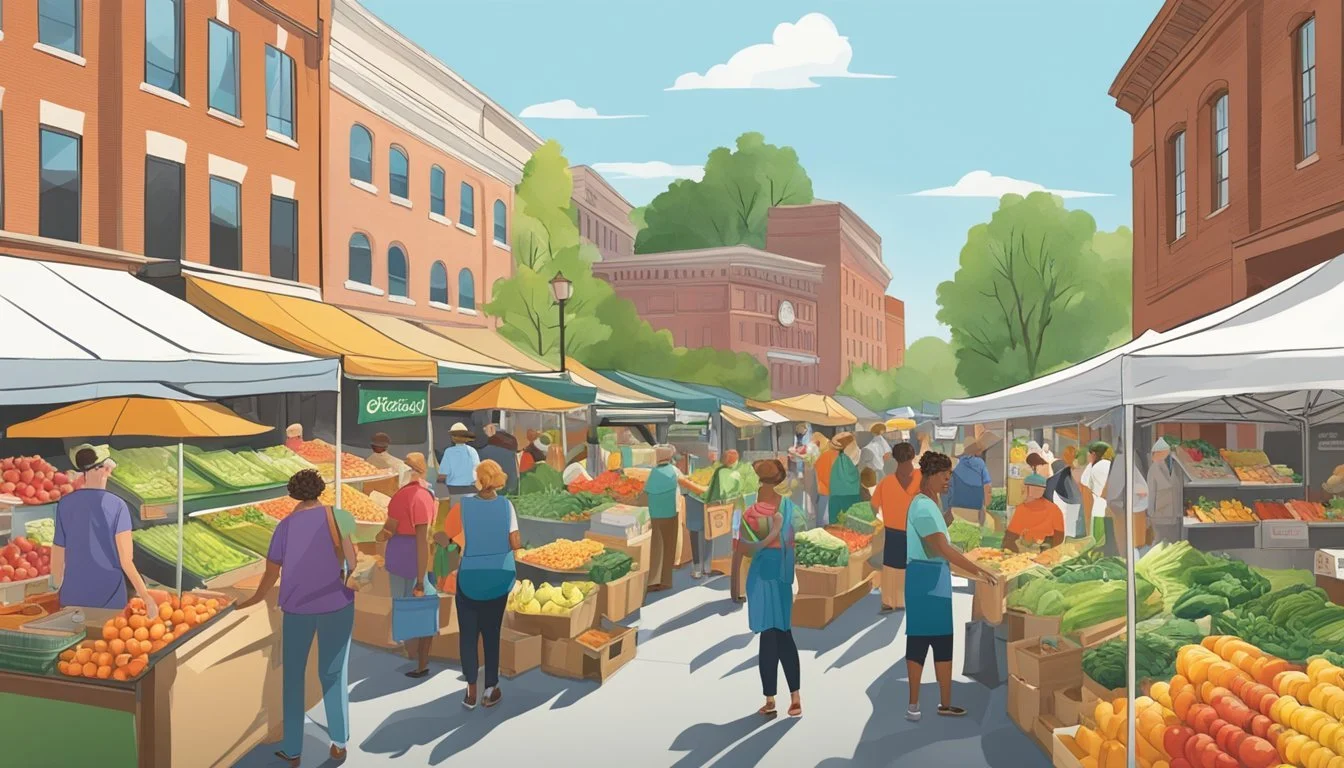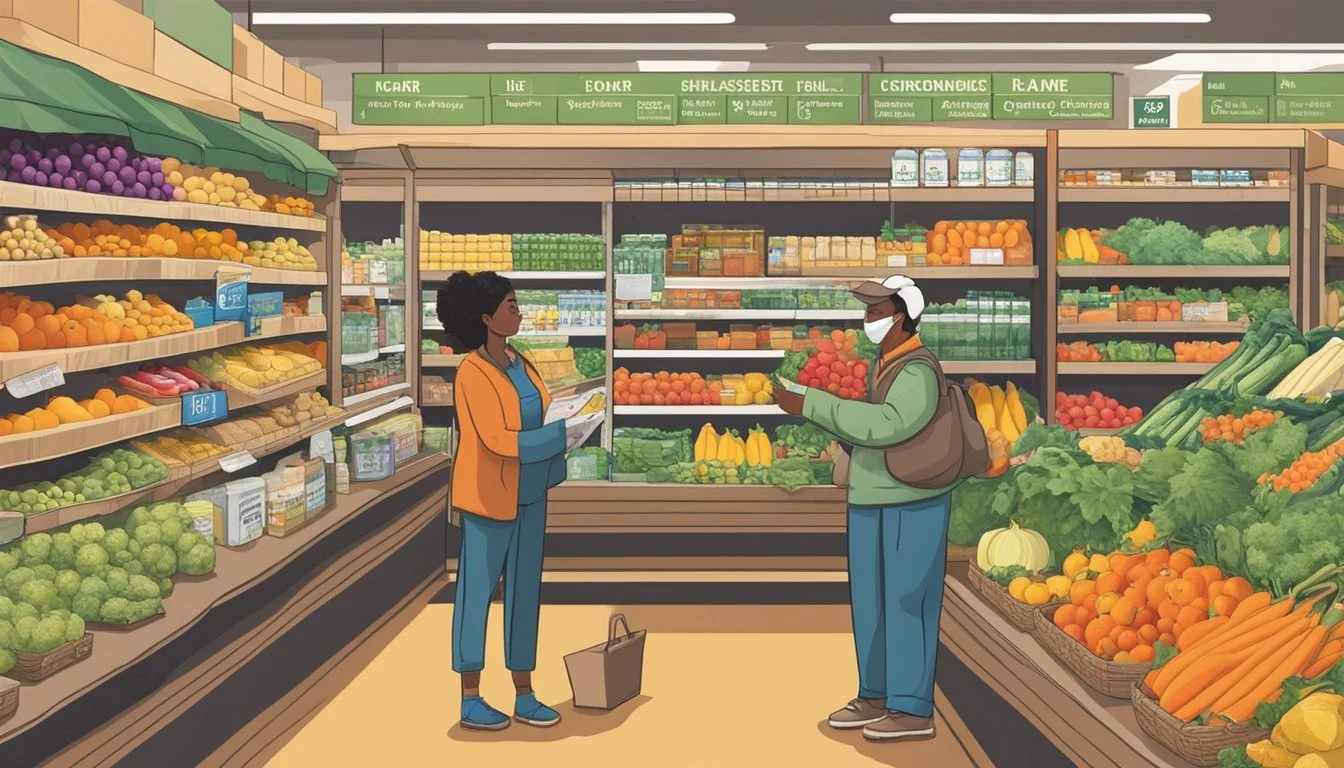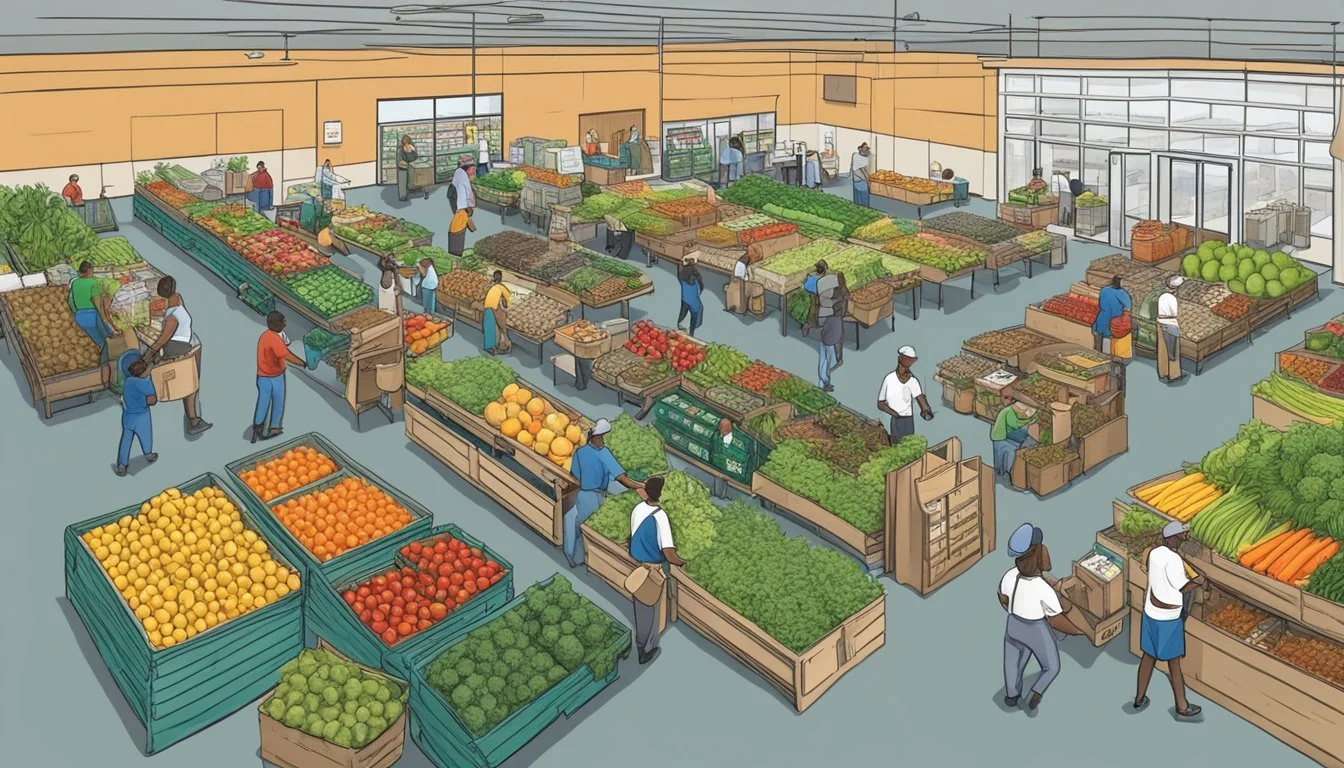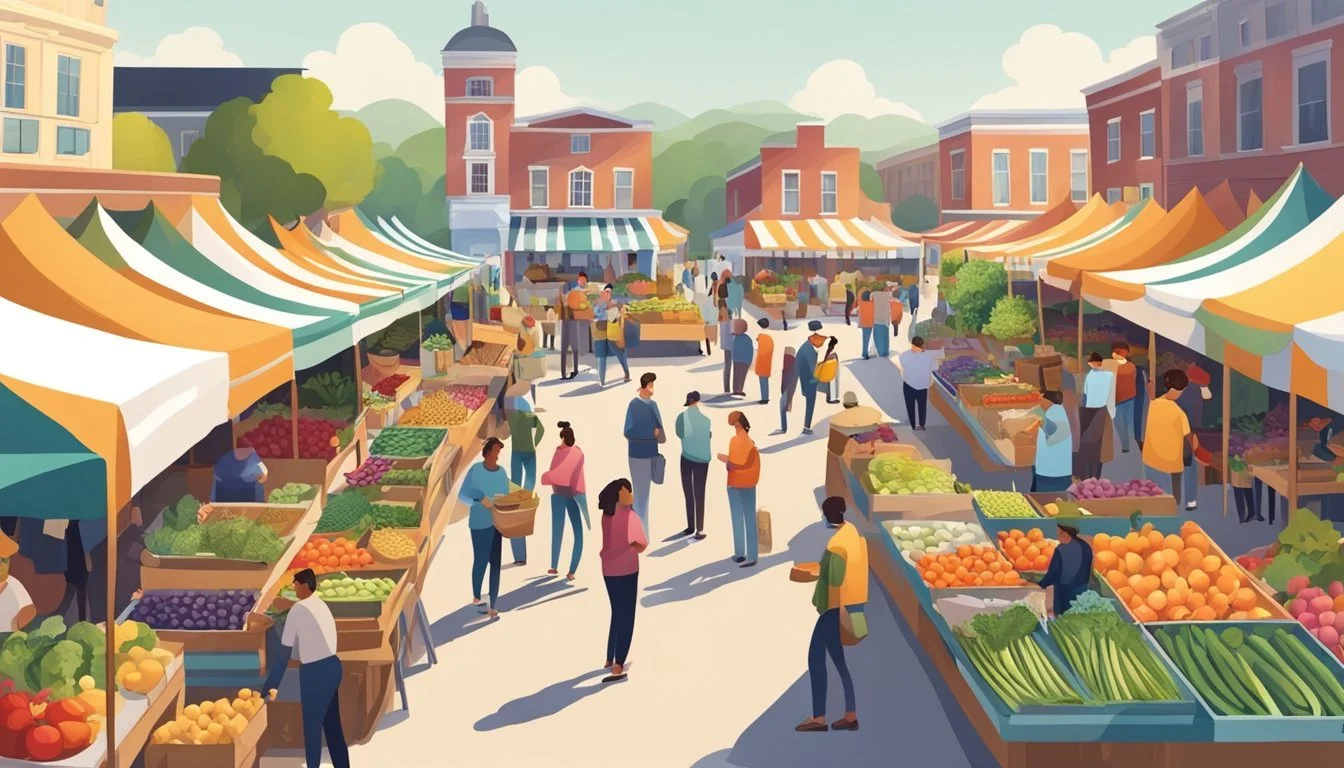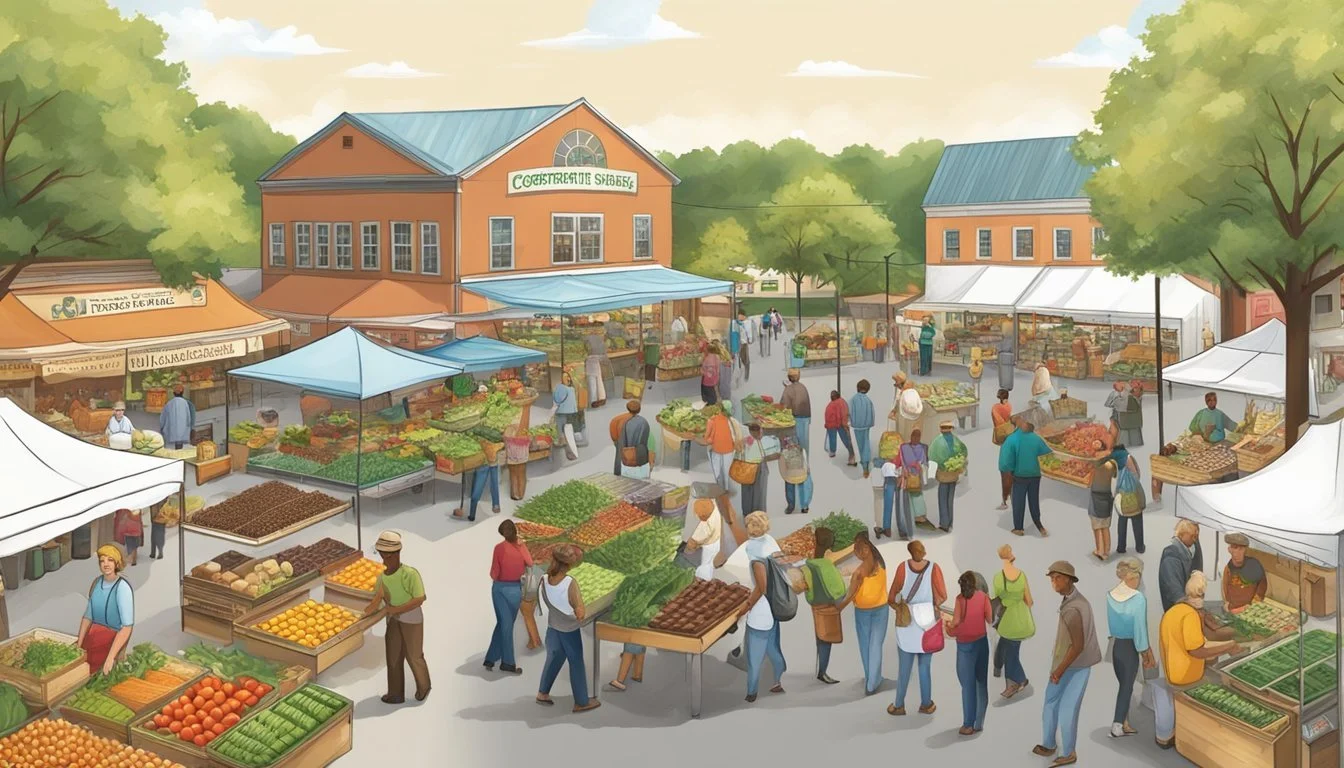Guide to Food Co-Ops in Greensboro, NC
Your Local Shopping Guide
Food cooperatives, often known as food co-ops, provide an alternative shopping experience that focuses on community and local products. Greensboro, North Carolina, boasts a selection of food co-ops, with a strong emphasis on supporting local farmers and producers, offering fresh, high-quality, and often organic goods to the community. As consumer-awareness increases, so does the interest in where food comes from and how it impacts both health and the environment.
Among the pioneers in Greensboro's food co-op scene is Deep Roots Market, recognized for its commitment to natural foods and cooperative principles. Operating since 1976, it is a cornerstone of the community, offering not just groceries but also a café experience. Such co-ops serve as focal points for both health-conscious consumers and those seeking to contribute to a sustainable local economy.
Navigating food co-ops in Greensboro is simplified with resources like the Food Co-op Finder. This tool connects shoppers with co-op grocery options, enhancing the accessibility of local, organic products. As the movement towards ethical consumption grows, food co-ops in Greensboro stand as a testament to a collaborative approach to groceries, where every purchase supports both local suppliers and a retail model that champions cooperative ownership and community well-being.
History of Food Co-Ops in Greensboro
The cooperative food movement in Greensboro has been marked by steady growth and community engagement, with Deep Roots Market serving as a pivotal institution since its inception.
From 1976 to the Present
In 1976, the foundation for what would become a longstanding cooperative institution in Greensboro was laid near Guilford College. It began as a small buying club for the college community who wanted access to wholesome and organic foods. Over the span of four decades, this initial effort blossomed into Deep Roots Market, Guilford County's thriving cooperative grocery store.
Key Milestones
1976: Initiated by members of the Guilford College community, the buying club set the stage for a more formalized co-op structure.
1980s: Transitioned from a buying club to a small storefront, marking its presence as a health food store prioritizing community access to organic products.
1990s: The co-op was firmly established in Greensboro, growing in both size and selection, responding to an increasing consumer interest in health-conscious and sustainable foods.
2013: A significant expansion occurred when Deep Roots Market moved to a larger facility at 600 N Eugene Street, enabling the co-op to serve an even broader segment of Guilford County.
Celebrating 40 years in 2016, the co-op has evolved with a commitment to local producers and providers, reflecting a robust partnership with the surrounding Greensboro area.
Understanding Co-Operatives
In Greensboro, NC, food co-operatives operate on the basis of member ownership and democratic control, adhering to established cooperative principles which benefit the community at large.
Definition and Principles
A cooperative, or "co-op," is an organization that is owned and run jointly by its members, who share the profits or benefits. The cooperative movement is guided by seven internationally recognized principles:
Voluntary and Open Membership: Co-ops are open to all who are able to use their services and willing to accept the responsibilities of membership.
Democratic Member Control: Co-operatives are democratic organizations controlled by their members.
Member Economic Participation: Members contribute equitably to, and democratically control, the capital of their cooperative.
Autonomy and Independence: Co-operatives are autonomous, self-help organizations controlled by their members.
Education, Training, and Information: Co-ops provide education and training for members to contribute effectively to the development of their cooperatives.
Cooperation among Cooperatives: Co-ops serve their members most effectively by working together.
Concern for Community: While focusing on member needs, co-ops work for the sustainable development of communities through policies approved by their members.
Member-Owning Structure
Cooperatives are fundamentally different from other business entities as they are owned and controlled by their members, who are also the users of the cooperative's services or products. These member-owners invest in shares to provide equity for the cooperative and have equal voting rights regardless of investment size—upholding the principle of one member, one vote. This structure ensures that control is equitable and not proportionate to capital contribution.
Benefits of Co-Ops
Food co-operatives in Greensboro offer several benefits to their member-owners and the wider community, such as:
Promoting food security by providing access to healthy, locally produced food.
Keeping profits within the local economy and contributing to the community's resilience.
Offering a democratic structure that empowers member-owners to have a voice in the operations and governance of the cooperative.
Prioritizing sustainable practices and social responsibility.
Local Impact of Co-Ops
Food co-ops in Greensboro, NC, significantly influence the area's economic health, agricultural vitality, and community solidarity. These entities intertwine with local systems to provide tangible benefits on multiple fronts, enhancing the quality of life in the region.
Boosting the Local Economy
Food co-ops are a cornerstone in strengthening Greensboro’s local economy. For example, each co-op typically supports a diverse array of local farms and producers, directly injecting capital into the economy. By purchasing and selling these locally-sourced products, they contribute to sustaining businesses and creating jobs within North Carolina.
Supporting Local Agriculture
Greensboro's food co-ops are committed to procuring from over 281 local farms and producers, on average. This number illustrates the depth of support provided to the agricultural sector, ensuring that farmers receive fair compensation for their produce, thus nurturing a sustainable and resilient local food system.
Community Development and Responsibility
These co-ops do more than just business; they embody community development and responsibility. With over 1.3 million members collectively, they're geared towards advancing health, equity, and sustainability. Investments in community initiatives and concern for community outcomes are central to their operation, reflecting a model that prioritizes collective well-being alongside economic success.
Products and Services Offered by Greensboro Co-Ops
Greensboro's food co-ops stand out for their high-quality food offerings and supportive services that cater to the community's needs. They provide a diverse range of products focusing on health, sustainability, and supporting local producers.
Organic and Natural Food Selection
Co-ops in Greensboro place a strong emphasis on providing a variety of organic and natural foods. Shelves are stocked with a wide assortment of organic produce, ensuring that customers have access to pesticide-free fruits and vegetables. Additionally, these co-ops often feature bulk herb and supplement departments, allowing customers to purchase the exact amounts they need and reduce packaging waste.
Organic Produce: A range of fruits and vegetables, sourced to meet organic standards.
Natural Food: Includes non-GMO, minimally processed products derived from nature.
Deli and Ready-to-Eat Options
For those seeking convenient, nutritious meals, Greensboro's co-ops offer a deli section with a variety of ready-to-eat options. They provide an assortment of fresh, often locally sourced prepared foods. Customers can enjoy a selection of hot meals, sandwiches, and salads, made with quality ingredients.
Deli Services:
Hot meals
Sandwiches
Salads
Specialty Departments
Apart from the basics, these co-ops house specialty departments to cater to diverse culinary and dietary preferences. The meat department offers an array of options including beef, pork, and other meats, focusing on ethical sourcing and quality. For those with a sweet tooth, an assortment of locally made ice cream is available. Co-ops also support local economies by selling locally made products, ranging from nuts to plants, showcasing the community's diverse agricultural offerings.
Meat Department: Ethically sourced beef, pork, and more.
Locally Made Products:
Nuts
Ice Cream
Plants
Role of the Community and Staff
In Greensboro's food cooperatives, the community and staff play pivotal roles where engagement, education, and defined responsibilities are essential for the sustainability and service the co-op provides.
Engagement and Contribution
The community in Greensboro actively engages with food co-ops, such as Deep Roots Market, to address and alleviate issues like food deserts. They contribute by participating in events and initiatives that aim to provide accessible, healthy food options to all community members. Their involvement is critical in raising awareness and sustaining the co-op through membership and volunteer work.
Education and Training
Education is a cornerstone of the food co-op movement in Greensboro. The staff and members organize and participate in programs that educate the community about making lifestyle choices that enhance wellbeing and environmental stewardship. Training is provided to ensure that everyone involved is informed about the products and services offered, as well as the operational guidelines of the co-op, which adheres to open and democratic principles.
Staff Roles and Responsibilities
Staff members at Greensboro food co-ops are tasked with a diverse range of responsibilities that ensure a supportive environment for customers and a healthy workplace culture. They are responsible for the day-to-day operations, upholding the co-op's ethos, providing excellent customer service, and being a reliable resource of information and education on products and the benefits of cooperative membership. Their role is fundamental in bridging the gap between the co-op’s offerings and the community’s needs.
Economic and Environmental Sustainability
Food co-ops in Greensboro, NC, function as platforms for economic growth and environmental stewardship, showcasing the link between local purchasing and sustainability. These entities embed profits back into the community, prioritize environmental responsibility, and encourage sustainable agricultural practices.
Reinvesting Profits into the Local Community
Food co-ops are community-focused businesses that reinvest profits directly back into the local economy. This reinvestment amplifies the economic vitality of Greensboro, supporting area farmers and producers. These efforts lead to the creation and maintenance of jobs within the locality.
Promoting Environmental Responsibility
Co-ops in Greensboro take actionable steps towards environmental responsibility. They reduce waste by offering bulk purchasing options and sustainable packaging solutions, significantly minimizing the community's carbon footprint. Programs like "Recycle Rodeo" reflect their commitment to not only reducing waste but also fostering an environmentally conscious food system.
Sustainable Agriculture Practices
The cultivation of a robust, local food system in Greensboro hinges on the promotion of sustainable agriculture practices. Co-ops support small-scale farmers who employ methods that enrich the soil, conserve water, and reduce chemical inputs. Such practices ensure the longevity of the environment while providing healthy food options for the community.
Choosing a Food Co-Op
When individuals or families in Greensboro, NC, are considering membership with a local food cooperative, they must evaluate factors such as the co-op's alignment with their lifestyle choices and the impact on their wellbeing. The decision can affect not just their household but also contribute to a broader community-oriented food system.
Factors to Consider
Location and Convenience: A food co-op's proximity to a customer's home or workplace can greatly influence the decision, as convenience is a key consideration.
Product Selection: Customers should seek co-ops that offer a broad range of products, including organic, local, and high-quality items that cater to their nutritional needs and preferences.
Membership Benefits: Understanding the perks of membership, like discounts, special orders, or participation in a food buying club, is vital.
Exploring Lifestyle Choices
Health-conscious Living: Food co-ops often provide healthier, more sustainable food options that suit customers committed to wellbeing and environmentally friendly practices.
Community Involvement: Many food co-ops thrive on member participation. Those looking to immerse themselves in a cooperative culture should consider their willingness to engage in events, volunteer opportunities, or governance.
Co-Op Governance and Operations
Food co-ops in Greensboro operate on democratic principles, ensuring that governance and policy-making reflect the needs and values of their members. These structures are essential for the cooperative's success and adherence to co-op values.
The Role of the Board of Directors
The Board of Directors in a Greensboro food co-op is fundamentally responsible for steering the cooperative towards a sustainable future. They articulate the cooperative's vision, mission, and objectives and oversee the implementation of policies and strategic plans. Each Board member is elected by the co-op’s membership and holds the duty to represent the interests of the members. Typically, Board positions are filled by members who actively participate in the cooperative and stand for election.
Policies and Decision-Making
Policies within a Greensboro food co-op provide the framework for its operations and member interactions. Policies range from member labor contributions and the allocation of profits to operational guidance and staff management. Decision-making is executed under the co-op's bylaws, which are agreed upon by the members.
Democratic Control: One member, one vote is the standard for decisions that steer the co-op, ensuring that all members have an equal say in the Co-op’s direction.
Relevant Policies: Include those related to profit allocation, sales, labor contributions, and non-discrimination to ensure a fair and productive environment for all members.
It is through adherence to these governance structures and policy frameworks that Greensboro food co-ops maintain their integrity and service to the community.
Networking and Partnerships
In Greensboro, NC, food co-ops leverage strategic networking and partnerships to enhance their impact and outreach. These collaborations reflect a commitment to shared values and community development.
Cooperation Among Cooperatives
Cooperatives in Greensboro actively seek partnerships within the local ecosystem. Deep Roots Market, for example, is part of the National Co+op Grocers (NCG), a collective that measures communal impact. Through this network, they exchange best practices and develop joint initiatives that amplify their collective goals. The Renaissance Community Co-op (RCC) and Greensboro Municipal Credit Union (GMCU) partnership showcases how cooperatives can bolster each other for mutual success.
Working with NC State Extension and USDA
Food co-ops in Greensboro also collaborate with educational and governmental entities. NC State Extension provides expertise in local food systems, supporting the co-ops with information and research for improved agricultural practices and sustainability initiatives. The US Department of Agriculture (USDA) further supports co-ops by offering grants and technical assistance, ensuring food cooperatives grow while adhering to federal guidelines and benefiting from USDA programs. These partnerships aim to promote healthy communities and strengthen local economies through cooperative principles and actions.
Co-Op Directory
This section provides a comprehensive guide to food co-operatives in Greensboro and the surrounding areas, along with essential contact details and hours of operation for convenience.
List of Food Co-Ops in Greensboro and Nearby Areas
Deep Roots Market
As Greensboro's sole co-operative grocery, Deep Roots Market offers a variety of all-natural and organic products, operating since 1976. It's a cornerstone for locals seeking quality food items.Weaver Street Market (Nearby in Carrboro and Chapel Hill)
This community-owned cooperative provides residents in the vicinity with a vast range of organic and locally sourced food options, reflecting a similar ethos to Greensboro's co-ops.
Additional notable cooperatives in the broader area could include ventures in Downtown Greensboro, serving residents from Guilford College Dormitory to the suburbs of High Point.
Contact Information and Operating Hours
Deep Roots Market
Address: 600 North Eugene Street, Greensboro, NC 27401
Phone: (336) 292-9216
Hours: To be ascertained from their website or a direct inquiry.
Weaver Street Market (Including Carrboro and Chapel Hill locations)
Addresses: Various, please refer to their official website for the specific location you plan to visit.
Phone: Numbers vary by location, details available online.
Hours: Operating hours differ per branch; it’s recommended to check directly for each store.
For accurate operating hours and contact details, visiting the respective co-op's official website or contacting them via phone is advised, as this information can change periodically.
Future of Food Co-Ops in the Region
The landscape of food cooperatives in Greensboro, NC is poised for evolution, with a focus on innovation and community impact. This section explores the direction in which these entities are headed and the role they play in shaping policy.
Trends and Predictions
Local and Sustainable Practices: Food co-ops in Greensboro are expected to intensify their commitment to local sourcing and sustainable practices. This mirrors a broader trend where co-ops nationally are engaging in regenerative agriculture that not only supports local farmers but also contributes to environmental conservation.
Technology Integration: Adoption of technology is likely to change how food co-ops operate, from inventory management to online sales platforms, increasing efficiency and accessibility for members.
Educational Outreach: Cooperatives may ramp up educational programs around healthy eating, cooperative economics, and sustainable farming, fostering a well-informed membership base.
Advocacy and Policy Influence
Legislative Engagement: Food co-ops in Greensboro are predicted to take a more active role in advocating for policies that support the cooperative model, including funding and development assistance.
Community Collaborations: Partnerships with local organizations can amplify the advocacy efforts, pushing for initiatives that address food insecurity and economic disparity.
Inclusive Policies: Progressive inclusivity policies are likely to be a hallmark of future co-ops, reflecting a dedication to serving a diverse membership and supporting minority-owned businesses.



